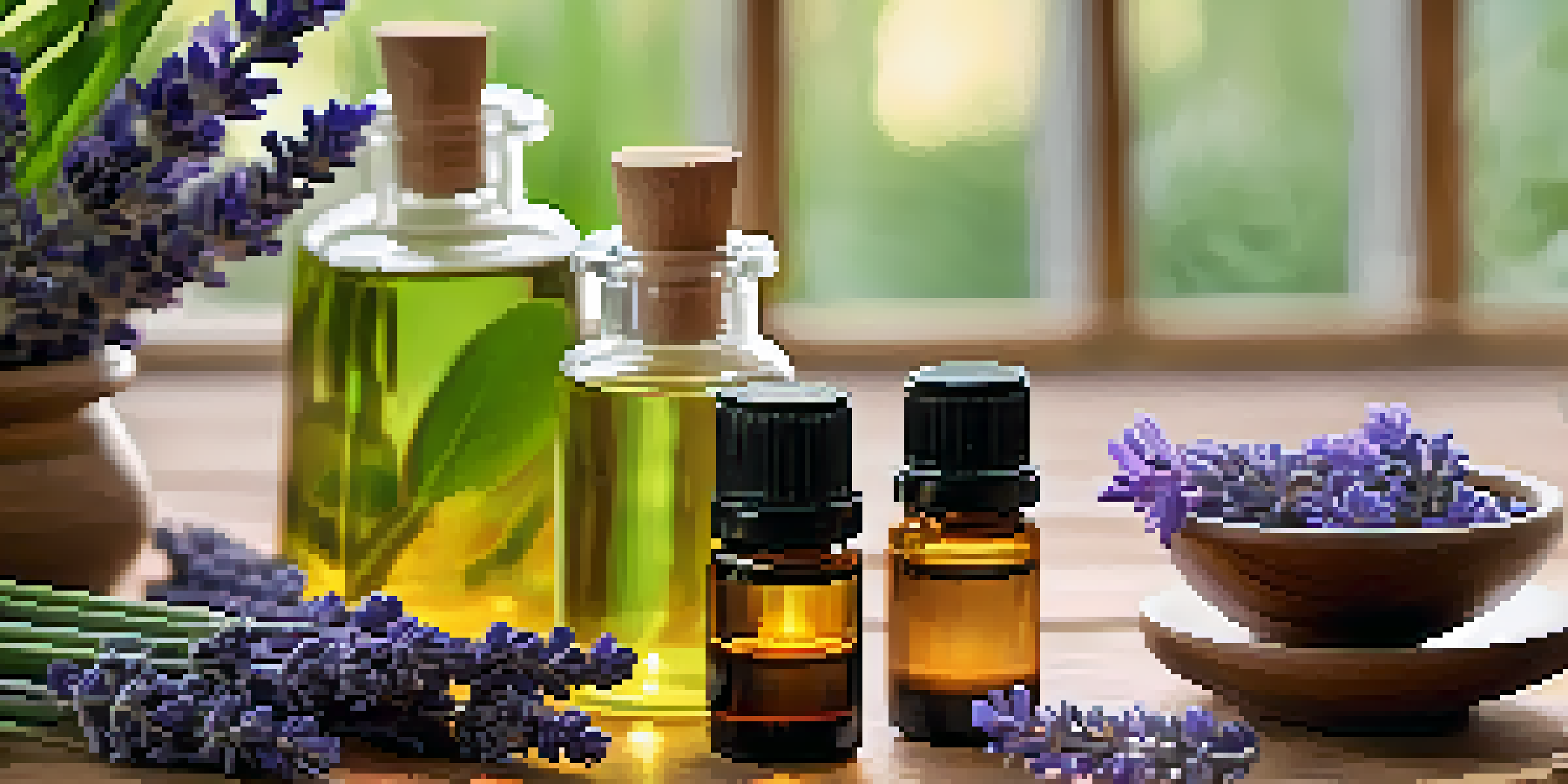The Science Behind Aromatherapy in Naturopathic Treatments

Understanding Aromatherapy and Its Origins
Aromatherapy is the practice of using essential oils extracted from plants for therapeutic purposes. This holistic approach has roots that stretch back thousands of years, with ancient civilizations like the Egyptians and Chinese utilizing fragrant oils for healing and wellness. The term 'aromatherapy' itself was coined in the 20th century, but its principles are steeped in tradition and cultural significance.
Aromatherapy is not just a luxury; it can be a very effective part of the healing process.
At its core, aromatherapy relies on the belief that the scent of essential oils can influence both our mental and physical well-being. For instance, lavender is often associated with relaxation, while peppermint may invigorate and uplift. These scents interact with our brain's limbic system, which plays a pivotal role in regulating emotions and memories.
Today, aromatherapy is often integrated into naturopathic treatments, enhancing the overall therapeutic experience. By incorporating these natural scents, practitioners aim to address not just physical ailments but also emotional and psychological needs, creating a comprehensive approach to health.
The Connection Between Scent and Emotion
Have you ever caught a whiff of a particular scent and been transported back to a cherished memory? This powerful reaction is due to the close relationship between our sense of smell and the emotional centers in our brain. Aromatherapy harnesses this connection to promote emotional well-being.

Essential oils like bergamot and chamomile are frequently used to alleviate stress and anxiety. When inhaled, these oils can trigger the release of neurotransmitters that enhance mood, creating a calming effect. This is why many people turn to aromatherapy during challenging times or when seeking relaxation.
Aromatherapy's Rich Historical Roots
Aromatherapy has ancient origins, with civilizations like the Egyptians and Chinese using essential oils for healing and wellness.
In naturopathic treatments, understanding the emotional impact of scents is crucial. Practitioners select specific essential oils tailored to an individual's emotional state, aiding in the treatment of conditions like depression or insomnia alongside physical ailments.
Scientific Evidence Supporting Aromatherapy's Efficacy
While aromatherapy has a rich history in holistic health, modern science has also begun to validate its benefits. Numerous studies have explored the effects of essential oils on various health conditions, providing evidence for their therapeutic properties. For example, research has shown that lavender can significantly reduce anxiety levels.
The use of essential oils can help people enhance their well-being by offering a holistic approach to health.
Moreover, specific oils have been linked to improvements in sleep quality. A study found that participants exposed to scents like lavender and chamomile reported better sleep patterns compared to those who weren't. This kind of scientific backing helps bridge the gap between traditional practices and contemporary medicine.
It's important to note that while aromatherapy can be beneficial, it is not a standalone treatment. Instead, it is most effective when used in conjunction with other naturopathic methods, such as herbal medicine and dietary changes, creating a synergistic approach to health.
Common Essential Oils Used in Naturopathy
In the realm of aromatherapy, certain essential oils stand out for their widespread use and effectiveness. Lavender, for instance, is a go-to oil for relaxation and stress relief, making it a staple in many naturopathic treatments. Other popular oils include eucalyptus for respiratory issues and tea tree oil for its antibacterial properties.
Each essential oil has unique benefits, often linked to its chemical composition. For example, citrus oils like lemon are known for their uplifting properties, while oils like frankincense are revered for their anti-inflammatory effects. This diversity allows practitioners to customize treatments based on individual needs.
Emotional Benefits of Scent
The connection between scent and emotion is powerful, as essential oils can trigger neurotransmitters that enhance mood and alleviate stress.
When considering aromatherapy as part of a naturopathic approach, it's essential to consult with a qualified practitioner who can guide you in selecting the most appropriate oils. This personalized approach ensures that the chosen oils align with your specific health goals.
Methods of Incorporating Aromatherapy in Treatment
There are several ways to incorporate aromatherapy into naturopathic treatments, making it a versatile tool for practitioners. One common method is through diffusion, where essential oils are dispersed into the air, allowing clients to inhale their therapeutic benefits. This creates a calming environment, enhancing the overall healing experience.
Topical application is another effective method, where diluted essential oils are applied directly to the skin. This can be particularly beneficial for localized issues, such as muscle pain or skin conditions. However, it’s crucial to ensure that oils are properly diluted to avoid skin irritation.
Additionally, aromatherapy can be incorporated into massage therapy, creating a multi-sensory experience. The combination of touch and scent can amplify relaxation and healing, making it a popular choice among clients seeking comprehensive care.
Safety Considerations in Aromatherapy
While aromatherapy offers many benefits, it's important to approach it with caution. Essential oils are potent substances, and improper use can lead to adverse reactions. For instance, some oils can cause allergic reactions or skin irritation if applied undiluted.
It's also essential to consider individual health conditions. Pregnant women, individuals with certain allergies, or those with underlying medical conditions should consult a healthcare provider before using essential oils. Understanding these safety considerations helps ensure a positive experience with aromatherapy.
Safety and Quality in Use
While aromatherapy offers benefits, it's crucial to use high-quality essential oils and consider safety precautions to avoid adverse reactions.
Lastly, quality matters. Not all essential oils are created equal, and using pure, high-quality oils is crucial for achieving the desired effects. Practitioners should source oils from reputable suppliers to guarantee their efficacy and safety.
The Future of Aromatherapy in Naturopathic Medicine
As the demand for holistic health solutions continues to rise, the future of aromatherapy in naturopathic medicine looks promising. More healthcare providers are recognizing the benefits of integrating essential oils into treatment plans, paving the way for innovative approaches to wellness. This growing acceptance suggests a shift toward more comprehensive, patient-centered care.
Research will play a critical role in this evolution. Continued studies on the efficacy of various essential oils will strengthen the scientific foundation of aromatherapy, potentially leading to broader acceptance in mainstream medicine. As we learn more about the complex interactions between scents and our bodies, new applications and methods may emerge.

Ultimately, the combination of tradition and science could create a powerful synergy in the world of naturopathy. By embracing both ancient wisdom and modern research, practitioners can offer clients a holistic approach that addresses both physical and emotional health.